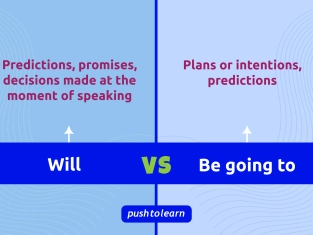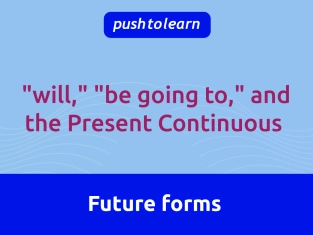by PushtoLearn
Be Going to – Plans and Predictions
Table of Contents
Be going to - Exercises
These exercises focus on Be going to
What Does Be Going To Mean?
The phrase "be going to" is used to express two things:
-
Plans: Things you have already decided to do.
-
Example: I am going to study English tonight.
-
Predictions: Things you think will happen based on evidence.
-
Example: Look at those clouds! It’s going to rain.

Structure of Be Going To
To use "be going to", follow this formula:
|
Subject |
Be (am/is/are) |
Going To |
Base Verb |
|
I |
am |
going to |
watch a movie. |
|
He/She/It |
is |
going to |
clean the house. |
|
We/You/They |
are |
going to |
travel tomorrow. |
Examples:
-
I am going to visit my grandparents.
-
She is going to cook dinner tonight.
-
They are going to play soccer after school.
Using Be Going To for Plans
When you have already decided to do something, use "be going to."
Examples:
-
Positive:
I am going to buy a new phone next week.
(You decided this earlier.) -
Negative:
He isn’t going to attend the party.
(He already decided not to go.) -
Question:
Are you going to take the exam tomorrow?
(You’re asking about their plan.)
Using Be Going To for Predictions
When you see evidence or feel sure about the future, use "be going to."
Examples:
-
Positive:
It is going to snow tonight.
(You see dark clouds and feel the cold weather.) -
Negative:
We aren’t going to win this game.
(You can tell because the team isn’t playing well.) -
Question:
Is it going to rain later?
(You’re asking based on the weather.)
Common Errors with Be Going To
-
Forgetting "be" (am/is/are):
-
Incorrect: I going to call my mom.
-
Correct: I am going to call my mom.
-
Using the wrong base verb form:
-
Incorrect: She is going to playing basketball.
-
Correct: She is going to play basketball.
-
Confusing "be going to" with "will":
-
Incorrect: I will going to travel.
-
Correct: I am going to travel.
-
Misplacing “going to”:
-
Incorrect: He is going play to football.
-
Correct: He is going to play football.
Comparing "Be Going To" and "Will"
|
"Be Going To" |
"Will" |
|
Used for plans made earlier. |
Used for decisions made now. |
|
I am going to visit my friend. |
I will visit my friend. |
|
Used for predictions with evidence. |
Used for general predictions. |
|
It’s going to rain (dark clouds). |
It will rain (just guessing). |
Everyday Use of Be Going To
Here are examples of "be going to" in daily life:
-
At work: We are going to have a meeting at 3 PM.
-
At school: I’m going to finish my homework tonight.
-
At home: They are going to decorate the house for Christmas.
FAQ About Be Going To
What is the difference between "be going to" and "will"?
"Be going to" is for plans or predictions based on evidence. "Will" is for decisions made in the moment or general predictions.
Can "be going to" be used for instant decisions?
No. Use "will" for instant decisions. Example: I’ll help you with that.
Can I use contractions with "be going to"?
Yes! For example: I’m going to go shopping.
Is "be going to" used in formal writing?
Not usually. In formal writing, alternatives like "will" or "intend to" are more common.
Can I shorten "going to" in speech?
Yes, in casual speech, people often say "gonna." Example: I’m gonna eat lunch.
However, avoid writing "gonna" in formal settings.

